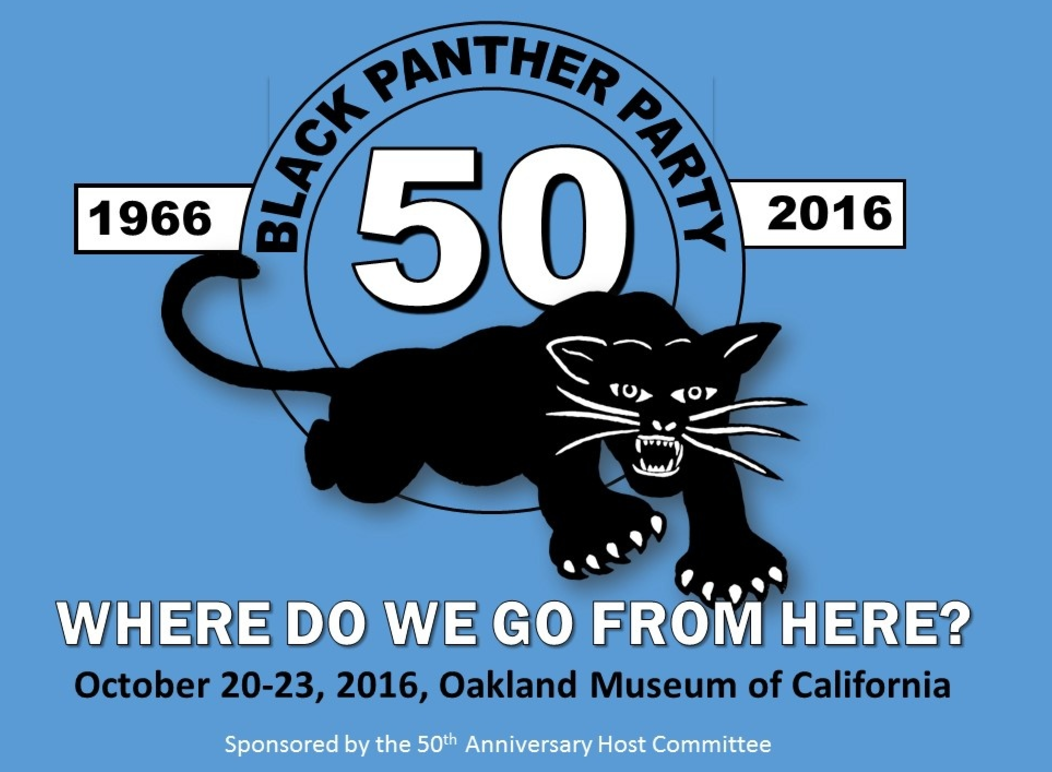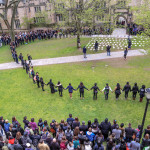by Azaria King, Amani Hill, Me’Lena Laudig, Chevonne Parker, Ambre Dromgoole, Gabby Cudjoe Wilkes, and Ikenna Nzewi
In attending the Black Panther Party 50th Anniversary conference, we as students from Yale reclaimed part of the Party’s history and a legacy of resilience.
Nowadays, we are constantly reminded of how much further we have to go in our fight for liberation as a community. The oppression of so many couldn’t be more apparent with the recent presidential election and the constant stream of reports of violence against marginalized communities. In light of the election and various current events, it’s extremely important for us all to resurrect the narrative of the Black Panthers in the American consciousness. There are many lessons to be learned from the Party, although it ended 20 years ago, that are applicable to our current social climate. The ideals and spirit of the Black Panther Party live on today even after the Party’s collapse, and there is still so much wisdom that the Party’s legacy leaves to this generation.
The Black Panther Party came to be during the 1960s when police brutality in Oakland, California fueled a sense of urgency in black America to challenge the constant oppression under which black Americans were living. Huey Newton and Bobby Seale founded the Black Panther Party for Self-Defense in 1966 in order to not only combat rampant police violence, but to also unite and empower black communities across the nation. With a series of welfare initiatives, such as the Free Breakfast and Grocery Programs, the Panthers supplied much needed support to black families that the government neglected to provide.
Beyond material support, the Party empowered the black community through political education as well, which was key for its members. The Black Panther Party’s use of political education provided a counter-cultural knowledge base from which they pulled their inspiration, dedication, and strength. Contrary to popular belief, the Black Panther Party worked within the system. They studied the law and knew it so well it became a tool they used to advance their cause. In critiquing the system and attempting to break it down and mold it to their liking with force and savvy, the Black Panthers showed people that they should not fear the government. This is crucial now with the political unrest in our country. Fear of laws, persecution and harm from the very institutions that are, in theory, supposed to protect us should not be a common expression. This was true then and it is true now.
Ultimately, this political education also provided unity and focus for the party and the greater community. The party knew why they were fighting and who their allies and foes were as a whole. From Kathleen Cleaver to Bobby Seale, Ericka Huggins to Barbara Easley Cox, they all, to this day, know exactly what they stand for because of a collective knowledge of law, government, and politics.
The Panthers demonstrated that coalition building was one of the key principles in the struggle for justice. This type of unity proved to be invaluable in such a fierce battle for justice. The “rainbow coalition” they built, compromised of Chicano, Puerto Rican, and Native American allies, among others, represents the type of cross cultural and ethnic network that this generation must also unite in our struggle.
At the conference, we learned that being an activist means fighting injustice in every sphere of one’s life For example, in a panel titled “Liberation Theology: The Black Panther Party and the Church,” we listened to Panthers speak about their present work as ministers. Being an activist to them entailed a life-encompassing struggle. From this talk, we realized that we must engage our activism of liberating the oppressed in every facet of our lives—our faith walks, our families, our cities, our careers—as well as support organizations and individuals who are also doing this work.
Another seminar focusing on the intellectual legacy of the Black Panther Party, titled “Where Do We Go From Here?”, discussed the revolutionary movement in the eyes of young adults was discussed. The Black Panther Party wasn’t a group of veterans–it was comprised mostly of teenagers and college-aged students who were fed up with the way society treated blacks in America. They were student activists who stood against police brutality and instituted programs to better their community.
One key point of the seminar detailed the importance of studying one’s community in order to incite change. The speaker repeated the saying, “If you want to change the community, you must know what it’s about.” The Black Panthers prepared themselves for self-defense; they studied the constitution and their human rights in order to protect themselves against wrongful imprisonment and fictitious accusations. For the Black Panthers, it was clear that the oppressed population did not know enough about the oppressor, yet the oppressor knew everything about them, which allowed the oppressor to confine the oppressed in their current state. We see the same issues of oppression today that the Black Panthers faced, for the systems of oppression have not changed. Instead, they have adapted.
As we organize against injustice, both as Yale students and American citizens, the Black Panthers leave us with a wealth of lessons. On a personal level, as college students, it is clear how much society takes for granted the brilliant potential of African-American youth. We have such a diverse group of people at our disposal willing to help, and if we were able to utilize them as effectively as the Black Panther Party did, we would come out victorious.
The Black Panthers did not arise out of a vacuum. Their work is a continuation of the legacies of the Student Nonviolent Coordinating Committee, and individuals like Malcolm X, Ella Baker and several others by whom they were trained and taught the necessities for being productive in the fight for justice. They used the experiences they had through also participating in facets of the broader Civil Rights movement in order to make their organization that much better. They also used the assets they had, such as people who had different experiences with political mobilization, and ran with it. It is imperative that there is a continuation of knowledge shared across generational lines that will successfully equip us for the long journey towards freedom and liberation.
This conference was a great start. This opportunity to channel the spirits of such passionate freedom fighters inspired us to engage in the struggle in a new way. A way that ensures we continue to build on the legacies of those before us, while forging our own path. In the words of the Black Panther Party: All Power to the People!



